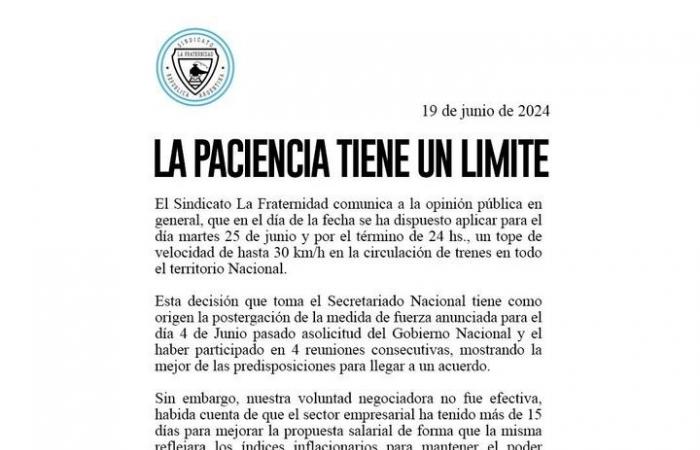The machinists’ union The fraternity confirmed that this Tuesday, June 25, the trains They will return to circulating at reduced speed by a measure of force to demand salary increases.
As they ratified Clarion sources from the union of drivers and assistants, the speed limit for trains on all lines will be 30 kilometers per hour. The force measure responds to a salary claim, after “four consecutive meetings” without results, the union explained.
A similar measure had been implemented by Omar Maturano’s union on May 30a day in which traveling by train became chaos, with delays and cancellations.
In a statement titled “Patience has a limit”, the union explained that the force measure will be for 24 hours and will have national reach. “This decision,” he says, “has as its origin the postponement of the force measure announced for last June 4 at the request of the National Government and having participated in four consecutive meetings showing the best of predispositions to reach an agreement”.
However, The Fraternity assures that his “will to negotiate” was not “effective”, since it indicates that the business sector had 15 days to improve the salary proposal, according to inflationary indices.
A response within that period would have allowed, the statement adds, “to maintain the food purchasing powerwhich has been systematically ‘liquefied’ since January 2024.”
The union alleges that instances of dialogue have been exhausted and that, consequently, “it resumes its combat plan that was postponed.”
On May 30, The Fraternity carried out an identical protest action, so traveling by train became almost an odyssey. The Sarmiento and the San Martín circulated on average half an hour late. In the case of Miter, 45 minutes. And Roca-La Plata, Bosques via Quilmes and Bosques via Temperley, between 30 and 50 minutes.
The reasons, then, were also based on the salary claim and the goal of the plan was still in force, a strike on June 4.
“They always gave us (increases) with delayed inflation. We can be crazy, but not stupid. Let them take us for the service we do. I can speak and make mistakes, I can make mistakes a thousand times and correct them, but the train driver made a mistake and nothing is corrected because he is in prison,” Omar Maturano, union leader, had reflected regarding the responsibility of the train driver. That time , Maturano said that a machinist receives $1,300,000 and that the salary must be updated according to inflation.
That Thursday, May 30, the speed restriction not only immediately caused delays in the trains, but the disruption of the schedule forced the cancellation of services and overloaded the bus system, chosen by those who – faced with unforeseen events on rails – preferred Change your routine to and from work.
To counteract the impact on train services, the Ministry of Transportation claims to have coordinated with collective companies from the suburbs a reinforcement scheme with lines whose routes coincide with those of the San Martín, Mitre, Sarmiento and Roca train lines.
More of one hundred lines This Tuesday units will be allocated for special routes between the railway headers with more influx of passengers. The bus lines that will reinforce each train line during the strike are:
- San Martin Line: buses on lines 24, 28, 34,39, 44, 47, 53, 55, 57, 59, 67, 78, 93, 105, 107, 108, 109, 111, 123, 124, 130, 134, 140 , 146, 152, 161, 166, 176 and 194;
- Rock Line: buses on lines 10, 17, 22, 24, 45, 51, 79, 95, 98, 100, 129, 148, 154 and 195;
- Miter Line: buses on lines 19, 28, 39, 41, 57, 59, 60, 67, 68, 71, 76, 78, 87, 90, 93, 107, 110, 111, 114, 127, 130, 133, 140 , 151, 152, 161, 168, 169 and 176;
- Sarmiento Line: buses on lines 1, 2, 8, 25, 26, 34, 46, 47, 49, 53, 55, 57, 63, 85, 86, 88, 96, 99, 103, 113, 126, 132, 136 , 141, 153, 163, 166, 172, 180 and 182.
It was not reported, however, what measures will be taken with respect to the Belgrano Line in its two branches, North and South, to try to mitigate the delays that the force measure could generate.
Crossfire: What the Government says about salary negotiations and La Fraternidad
From the Transportation portfolio, however, they claim not to understand the measure adopted by La Fraternidad. The negotiations, which lasted several weeks, had no effect, but the reasons seem to intersect among those involved.
In the portfolio led by Franco Mogetta they affirm that the increase proposed by the Government for railway workers It was accepted by almost all the unions in the sector, with the exception of 13% of the register, which responds to La Fraternidad.
Instead, they maintain that this union bid, until now, for a higher increase to that offered by the Ministry of Labor of the Nation, which generated damage for the union workers themselves, who have not yet received the increases (2% for May and 7% for June) that other railway unions have already received.
“Sanity and maturity should prevail. They have million-dollar basic salaries and they are going to complicate the lives of workers,” they complained in Trabajo, from where They ruled out that the Government is going to dictate a mandatory conciliation.
A Government source who has known the world of trains since previous administrations was even more blunt to illustrate his confusion about the intransigence of La Fraternidad. “Have more than three thousand workers: they are all machinists and machinists’ assistants, in addition to about 200 union positions“.
The Government provided a breakdown in that regard. According to their survey, the Miter line has 692 workers, the Roca 900, the Sarmiento 471, the Belgrano Sur 329 and the San Martín has 537. “The San Martín, for example, has 12 locomotives and the more than 500 employees are for that number of machines,” the official said.
About the issues there are salary discrepancies: while La Fraternidad maintains that a machinist earns $1,300,000, the Secretariat places the average salary of workers in the industry at $1,500,000 for a six hour day labor, while it points out that there are more than 200 positions that, for reasons of union representation, reach 2.8 million pesos monthly.
“Are they talking about losing against inflation? We should ask them if they didn’t lose with Massa,” they chicane from the Human Capital orbit. “All unions understand the political and restrictive reality that exists, but These guys are going to clash being a minority within the workers they represent“.







